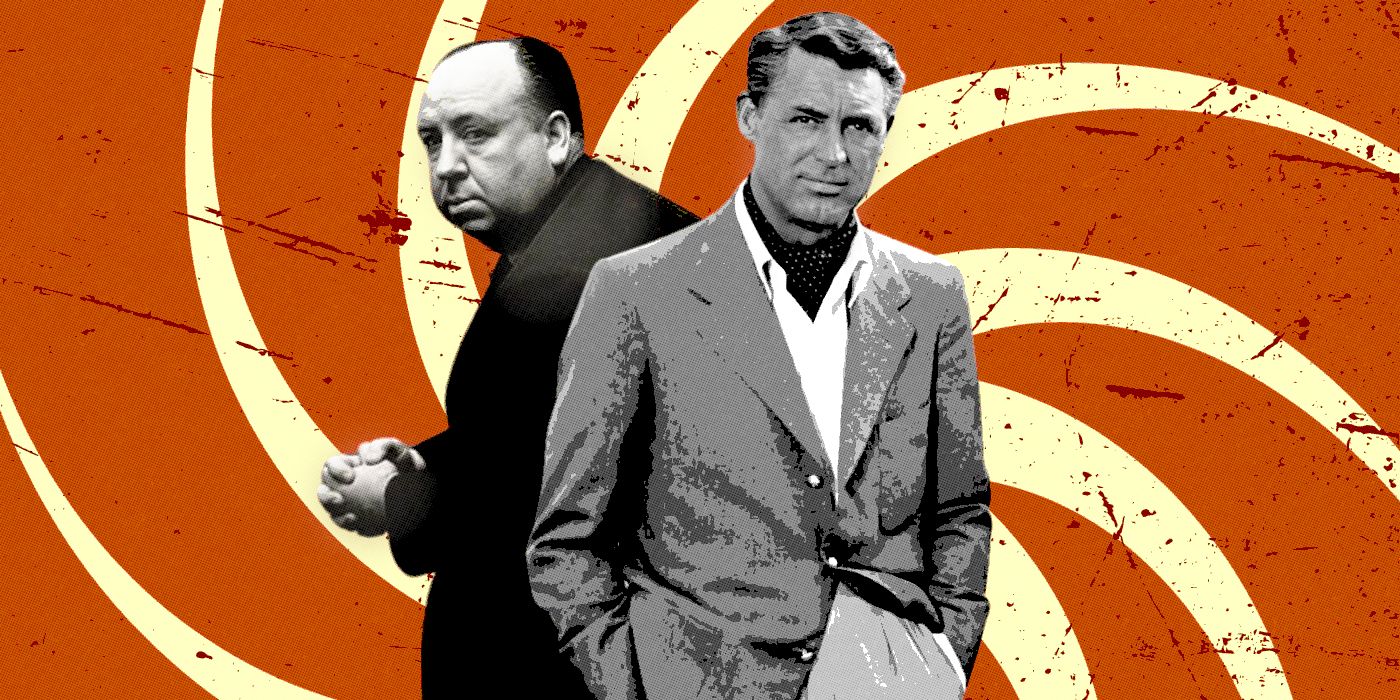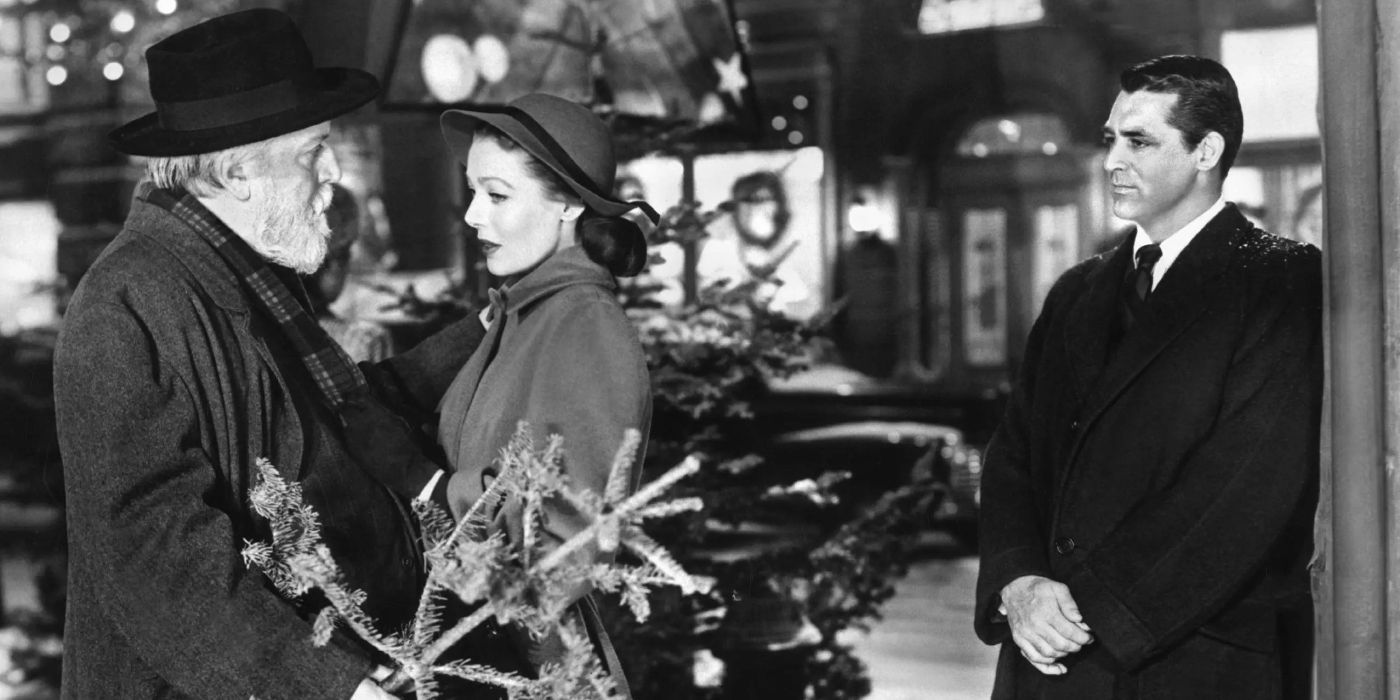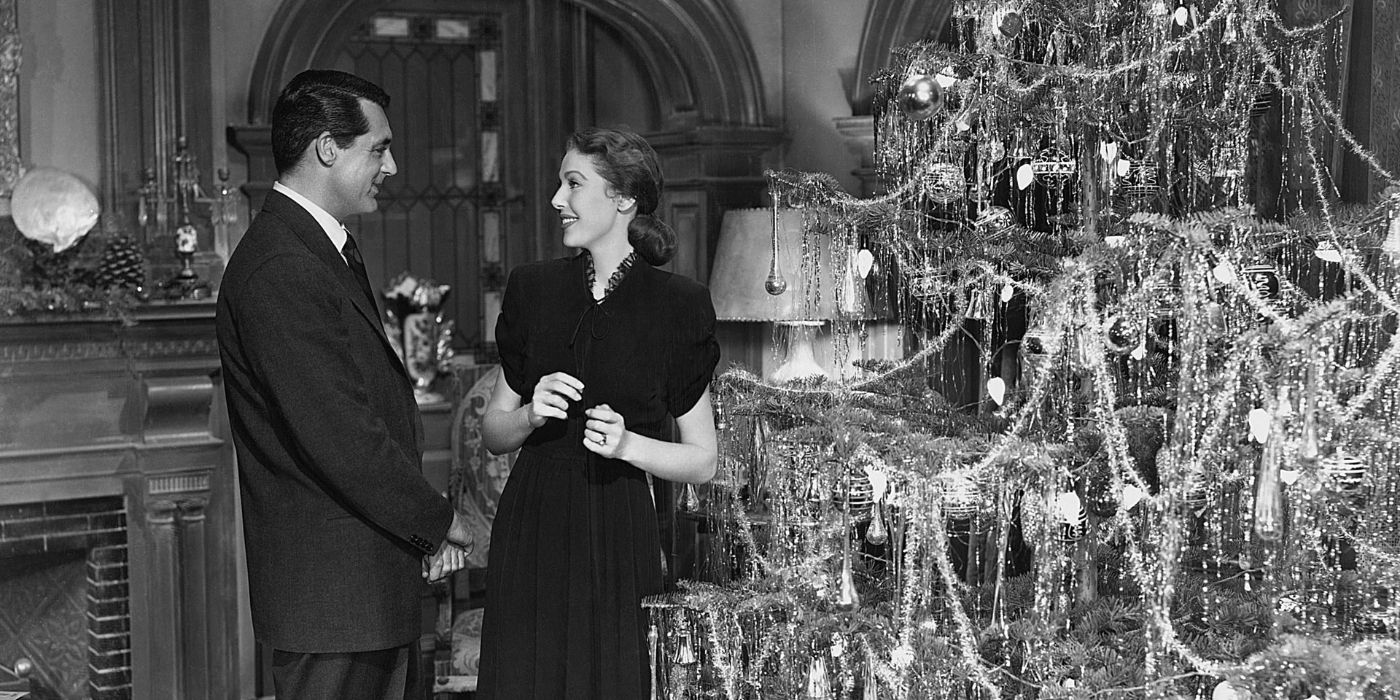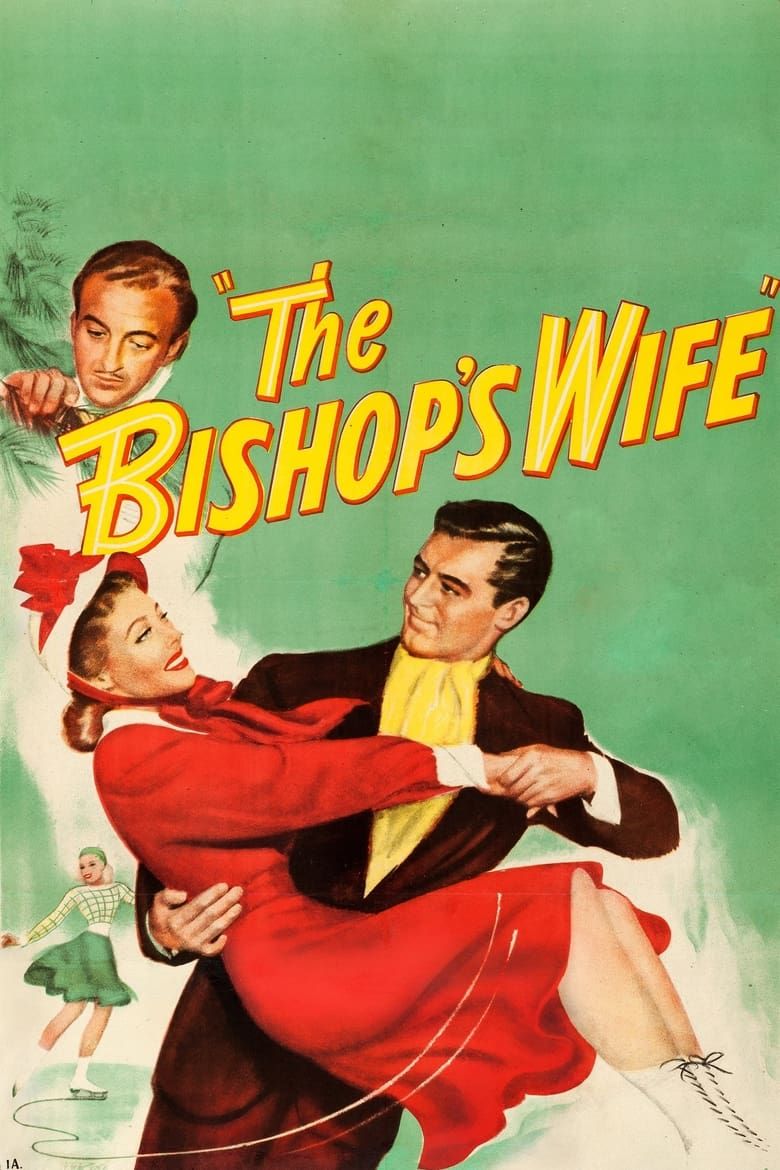Well over 100 years since his birth, Cary Grant is still the moment. Who are we to argue? Few actors continue to so effortlessly captivate viewers across all generations and make that achievement look as easy as breathing — or, in Grant’s case, an elegantly inelegant pratfall. There’s a film for every taste within Grant’s substantial oeuvre, and that includes the lovely but nebulous season in-between November 1 and December 31. When breath fogs the air and twinkling lights illuminate dark town streets, winter predisposes us to favor The Bishop’s Wife.
Based on author Robert Nathan‘s 1928 book of the same name, released in 1947, and directed by Henry Koster, the Christmastime-set movie sees the devilish Grant both play against type and skirt alongside it as Dudley, cinema’s most charming angel. Dudley’s celestial mission involves helping a struggling family. Problems arise when this ostensibly responsible, morally subservient member of the heavenly host falls in love with the titular bishop’s wife. This movie offers more meaty elements than one might expect from its openly religious slant. It argues the world is going to hell in a Formula One-speed handbasket when personal ambition supersedes caring for the needy. It’s also a cozy holiday fable rocking that quintessential old Hollywood magic. And, of course, Grant plays a lovestruck angel who’s willing to turn mortal for a married woman. (Her husband’s a jerk, it’s fine.)
Despite a Lowly Box Office, ‘The Bishop’s Wife’ Received Critical Acclaim
Cary Grant was well-established by 1947. The silver screen legend had already turned in a good chunk of his most famous performances, like The Awful Truth, Bringing Up Baby, His Girl Friday, The Philadelphia Story, and Notorious. His hold on the public was impressive enough that when The Bishop’s Wife failed to drum up box office interest during its theatrical debut, producer Samuel Goldwyn of the Metro-Goldwyn-Mayer studio, temporarily renamed the film Cary and the Bishop’s Wife. That decision was a bingo: ticket sales increased 25% thanks to the fourth-biggest male star in the world behind Bing Crosby, Gary Cooper, and Clark Gable.
Despite this bumpy start, The Bishop’s Wife was no slouch. It received five Academy Awards nominations, including Best Motion Picture, Best Director, Best Film Editing, and Best Score, and won Best Sound Recording. Decades later, director Penny Marshall put her spin on the idea with her 1996 film The Preacher’s Wife — another holiday favorite — starring Whitney Houston and Courtney B. Vance as the struggling married couple while Denzel Washington inherited Grant’s wistfully angelic Dudley.

Related
Hitchcockian Thrillers Owe a Great Debt to Cary Grant
The charismatic actor became Hitchcock’s most important collaborator.
Joining Grant in The Bishop’s Wife‘s dramatic axis are Henry Brougham (David Niven), an Episcopalian bishop, and his long-suffering wife Julia (Loretta Young). The basic circumstances are almost It’s a Wonderful Life from the angel’s perspective. Henry, desperate to rebuild his tiny church into a grandiose cathedral, implores God for help. Heaven intervenes with Dudley, but not before Henry’s fixation with saving St. Timothy’s (his church) has consumed him. The clergy should serve those in need. Henry forsakes everything and everyone to improve a building. His strained relationship with his family barely registers. The devoted Julia keenly feels her husband’s absence, as does their daughter Debby (Karolyn Grimes).
Enter Dudley, a literal answered prayer. (And cue a bad joke about praying for Cary Grant.) He pops in to improve the Broughams’ lives, just not in a way accordant with Henry’s warped priorities. The eternally charismatic Grant is exactly that: winsome and effervescent. Yet he’s a different kind of dashing than the persona typically summoned to mind by the name “Cary Grant.” For Dudley, an angel earning his wings, Grant tempers his elegance into something benevolent. There’s that un-erasable mischief in his glinting eyes (after receiving a “god bless you” sentiment, he replies, “I’ll pass that recommendation along!”), yet the selfless Dudley is beatific. Dudley’s warmth is more akin to an eternally cheerful coworker or a parent’s quiet patience than Grant’s customary sass. He’s chipper, calming, a little sneaky, and corrective without malice. Above all, Dudley is a protector, an aspect Grant introduces with his reserved cheer and underlines with a watchful physicality. Dudley considers attending to people a privilege, and Grant exudes confidence in his skin. The camera’s bold enough to linger on him as he interacts with a room because Grant’s crisp ease can command audiences’ attention.
Cary Grant Is at His Most Charming in ‘The Bishop’s Wife’
Speaking of Henry, the resident bishop doesn’t trust Dudley. He’s the outlier among a line of goners: his wife and daughter, the Brougham’s maid (a smitten Elsa Lanchester), and the town’s most dubious of miserable cynics. That’s Dudley’s influence — one identical to Cary Grant’s except kaleidoscoped through a different lens and with divergent intentions. Dudley twists fate to ensure that the small things that matter the most win over humanity’s worst instincts. Sure, Dudley saves a baby stroller from rolling into traffic, which is as much an establishing good guy move as kicking a puppy indicates a villain. He also makes sure Debby joins a snowball fight and the boys’ choir arrives on time. Sweeping moments of revelation aside, the tiniest moments pile up and heal hearts over time.
If you’re of a certain disposition, however, nothing bests Dudley falling in love with Julia. Given the movie’s title, it’s an unfortunate oversight that the bishop’s wife isn’t the central character. Julia’s most empathetic moments show she has every right to feel heartbroken about her marriage. She’s grieving the love she shared with Henry and resigning herself to a routine of constant disappointment, isolation, and dismissal — if Henry even remembers her in the first place. Dudley’s crush starts inoffensively poignant: staring up the stairs after a distraught Julia. The more Henry’s absent, the more Dudley’s love evolves into loaded hand-holding, sustained eye contact, and impromptu cheek-to-cheek ice skating. Grant lends Dudley a sense of astonished wonder. An immortal being is captivated enough by this human woman to deploy longing looks and enormous grins; suddenly, Dudley’s divine charm has a heartier weight behind it. To facilitate Julia’s happiness, Dudley misbehaves. He drinks in her joy. Their cab driver assumes they’re engaged, and, like, duh, of course he does when Cary Grant looks at her like that.

Related
Hitchcock Lured Cary Grant Out of Retirement With This Iconic Twisty Thriller
Cary Grant retired, but this Hitchcock film got him back on screen.
Dudley’s willingness to reject heaven for a mortal woman — and/or the fact he told a jealous Henry that “I represented you with your wife” — finally jolts Henry out of his trance. I suppose it’s impressive Henry wants to fisticuffs a celestial being for his wife. But this is Dudley, the steal-your-girl meme incarnate who deserves to get the girl, in large part because Julia deserves better. But the Hays Code wouldn’t allow even angelic adultery. Julia tells Dudley to leave. Once Dudley’s job is done, he honors her request. He remains selfless even after pouring his heart out to Julia in a speech worthy of Jane Austen. The family won’t remember him, and his watchful stare is now yearning. But he’s satisfied; he bettered their lives. Cary Grant delivers a subtle, soft, and cognizantly different performance from an actor who was never necessarily boxed into archetypes but still had a recognized style by association. Dudley is the angst of an angel wanting a woman he can’t have, and never once does Grant make that feel silly, saccharine, or cheap. Just earnest, genial, and kind without guile.
Cary Grant Wasn’t Supposed To Play Dudley in ‘The Bishop’s Wife’
In an interesting twist of fate, Grant was originally slated to play Henry against David Nevin as Dudley. There are contradictory testimonies about how the two men wound up swapping roles. Director Henry Koster claims that he and Samuel Goldwyn decided their leads were miscast, and the shift “made Grant unhappy throughout the duration of the shoot,” according to AFI Catalog. Turner Classic Movies, meanwhile, reports that Grant wasn’t pleased with the initial script and insisted on some crucial rewrites. It was during this process that Grant supposedly saw more potential in playing Dudley than Henry, and wanted to switch with his co-star.
Goldwyn brought in Billy Wilder and Charles Brackett to improve Robert Sherwood‘s initial draft; the changes they made were also informed by early audience feedback. At one point, The Bishop’s Wife even cycled through directors (including record-making Oscar-winning William Wyler) before landing on Koster. Regardless of however Grant became Dudley, it’s possible that he had second thoughts; TCM claims that the actor “wondered if perhaps he should have stuck with his original role.” With due respect to Niven, an alternative universe where Cary Grant isn’t Cary Grant-ing his way through Dudley is difficult to contemplate.
‘The Bishop’s Wife Is a Perfect Christmas Movie
The Bishop’s Wife makes for a perfect holiday watch on cold winter nights. It captures the uniquely old-fashioned Hollywood mirage of Christmas: snow-covered streets, frozen lakes, mittens and coats, jingling bells and well-wishes, choruses of caroling children, families with their noses pressed against department store windows. That’s the same comfortable spectacle evoked by Miracle on 34th Street and It’s a Wonderful Life. The Bishop’s Wife just tosses in a Cary Grant-ified angel magically decorating a Christmas tree for good measure.
The rest of this film is an indictment and a half. Two years out from World War II and eight since the last year of the Great Depression, The Bishop’s Wife advocates against materialism. It argues that the money Henry raises to transform his humble cathedral into a grand one — via a rich patron advancing her ego — is wasteful. Such money could provide food and shelter to countless individuals. To ensure St. Timothy’s “[stands] up against the march of progress,” Henry forgets why the institutional church exists: to welcome all people and celebrate them for their differences. Dudley’s God remembers “even the lowliest sparrow,” and friendly cab drivers argue that the world would be a better place if “people could only learn to behave like human beings.” Such assertions never compromise the cozy Christmas atmosphere viewers seek; they enhance it. Much like real life in the 2020s, The Bishop’s Wife holds two opposing truths in tandem: battling against narcissism and celebrating Christmas joy.
Behaving like a decent human in The Bishop’s Wife includes not being an ignorant jerk to your family. Henry makes amends with his neglected wife and daughter, and in one small corner of the world, things have improved. Before Dudley departs, he pointedly reminds Henry that the beleaguered bishop actually prayed for guidance, not a bigger church. It was Henry’s choice to embrace or ignore his personalized divine wake-up call. Modern viewers can take as much or as little as they want from The Bishop’s Wife. A deeper message about moral principles: the nostalgic, un-recreatable Christmas mood, or just Cary Grant as a lovestruck angel in unrequited love. Any of those is enough. Altogether, they make a triple loop ice skating jump that sticks the landing with grand — should I say, Grant — flourish.
The Bishop’s Wife is available to watch on Peacock in the U.S.
Watch on Peacock












